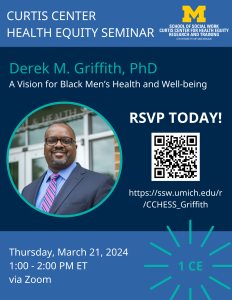Presented By: School of Social Work
Curtis Center Health Equity Seminar Series
Featuring Dr. Derek M. Griffith of Georgetown University

Our next Curtis Center Health Equity Seminar Series features one of our esteemed External Advisory Board Members, Dr. Derek M. Griffith.
His talk is titled, A Vision for Black Men's Health and Well-being.
Dr. Griffith will discuss the fact that in the United States, federal policy and infrastructure fail to explicitly address the poor health of men, and particularly the poor health of marginalized men. This inattention to men’s health hinders the nation’s ability to improve population health, to achieve gender health equity, and to achieve health equity more broadly.
Expanding efforts to consider gender in federal policy and infrastructure to include men, naming men as a population whose poor health warrants policy attention, creating offices of men’s health in federal agencies, and utilizing an intersectional lens to develop and analyze policies that affect health would likely yield critical improvements in population health and health equity in the United States.
Using data from the CDC and the case of Black men, Dr. Griffith will illustrate the persistence of sex differences in mortality and leading causes of death and the importance of an intersectional approach to achieve gender and racial equity in health.
This event is free and offers 1 CE credit! The Continuing Education option is free, but requires participation in interactive elements and completion of evaluation following the seminar.
His talk is titled, A Vision for Black Men's Health and Well-being.
Dr. Griffith will discuss the fact that in the United States, federal policy and infrastructure fail to explicitly address the poor health of men, and particularly the poor health of marginalized men. This inattention to men’s health hinders the nation’s ability to improve population health, to achieve gender health equity, and to achieve health equity more broadly.
Expanding efforts to consider gender in federal policy and infrastructure to include men, naming men as a population whose poor health warrants policy attention, creating offices of men’s health in federal agencies, and utilizing an intersectional lens to develop and analyze policies that affect health would likely yield critical improvements in population health and health equity in the United States.
Using data from the CDC and the case of Black men, Dr. Griffith will illustrate the persistence of sex differences in mortality and leading causes of death and the importance of an intersectional approach to achieve gender and racial equity in health.
This event is free and offers 1 CE credit! The Continuing Education option is free, but requires participation in interactive elements and completion of evaluation following the seminar.